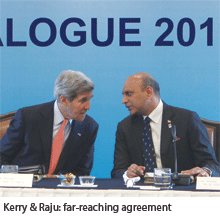Delhi: Belated awakening
Even as passage of the Foreign Educational Institutions (Regulation of Entry and Operations) Bill introduced in 2010, is blocked in Parliament by opposition parties, India-US collaboration in higher education is proceeding on a parallel track. Several important agreements to enhance cooperation in higher education were signed during the second Indo-US Higher Education Dialogue held in New Delhi on June 25.
 This year’s Indo-US dialogue wasn’t just another talk fest. It was co-chaired by the reclusive Union human resources development (HRD) minister, Dr. Pallam Raju, and US secretary of state and former Democratic Party presidential candidate John Kerry. Four agreements of great potential were signed between IIT-Delhi and University of Nebraska on joint development of cyber systems; IIT-Bombay and edX on introducing massive open online courses (MOOCs) in India; All India Council for Technical Education (AICTE) and the American Association of Community Colleges for cooperation in promotion of community colleges in India, and between the ITM group of institutions, and Montgomery College, Maryland on cooperation in creating capacity in business management education.
This year’s Indo-US dialogue wasn’t just another talk fest. It was co-chaired by the reclusive Union human resources development (HRD) minister, Dr. Pallam Raju, and US secretary of state and former Democratic Party presidential candidate John Kerry. Four agreements of great potential were signed between IIT-Delhi and University of Nebraska on joint development of cyber systems; IIT-Bombay and edX on introducing massive open online courses (MOOCs) in India; All India Council for Technical Education (AICTE) and the American Association of Community Colleges for cooperation in promotion of community colleges in India, and between the ITM group of institutions, and Montgomery College, Maryland on cooperation in creating capacity in business management education.
Perhaps the most far-reaching of these agreements is the one between AICTE and American Association of Community Colleges for promotion of much-needed community colleges in India. Very belatedly the Planning Commission, ill-advisedly empowered to micro-manage investment flows in the entire Indian economy, and India’s myopic academic community — confronted with massive and disguised unemployment estimated at over 100 million countrywide — have discovered the socio-economic value of community colleges.
It’s doubtful if any Central planning or academic guru in India is aware that 73 percent of students in higher education in the US and most OECD countries, are enrolled in community colleges where they typically sign up for two-year post-secondary occupational/ paraprofessional study programmes (hospitality, business, technical trades, accounting etc), and are awarded associate degrees. Moreover, they are also awarded certificates for programmes of shorter durations in repair services, transportation, computer and information sciences, precision tools production and real estate and construction licencing.
“Few other educational systems around the world allow students to transfer credits readily from one institution to another… Only US community colleges provide pre-baccalaureate education, short-term vocational training, adult education, and job entry and professional upgrading in technology, health professions and other occupations, all under one roof,’’ says Arthur M. Cohen, professor of higher education at the University of California, Los Angeles (www.4uth.ua/english/edu/jse0602/cohen.html).
However despite Central planning, VET (vocational education and training) in schools and post-school years has been criminally neglected in post-independence India with barely 3 percent of the country’s 400 million workforce boasting formal vocational education. This policy error is compounded by the conspicuous absence of community colleges.
“Community colleges are long overdue in India. Our Industrial Training Institutes (ITIs) which could have provided the interim relief have been a neglected story. Consequently India’s manufacturing sector and businesses in general suffer lack of employable people because of the widening gap in vocational education and industry requirements. Though India is still a long way from replicating the American model of community colleges, push from the government may hasten things, which is indeed welcome,” says Jaiprakash Singh Hasrajani, a Chandigarh-based edupreneur, who has promoted Taaleem India, a skills development company, and is also the co-convener of the skills development committee of CII, Chandigarh.
Union HRD minister Pallam Raju, who reportedly travelled across the US this summer to study community colleges, is upbeat about this particular outcome of the Indo-US dialogue, and the ministry is busy developing a framework for such colleges in India. “We are borrowing the concept and will adapt it to Indian conditions. We won’t be replicating the US experience as economic conditions of the two nations are quite different,’’ said Raju, while affirming the Union government’s resolve to promote community colleges in India. Later this year, American community colleges will host several delegations of community college leaders from India to aid and advise them on ways and means to establish 200 community colleges within the next few years.
Better late than never!
Autar Nehru (Delhi)















Add comment